
(Manuel Ortiz)
At Echo Park Lake, a young woman sits on the grass, watching geese glide across the water as the sun sets. Nearby, a family pedals duck boats, laughing and soaking in a rare moment of quiet. Across the city, from Grand Park to Marsh Skate Park, journalist Manuel Ortiz found Angelenos coming to parks for the same reason: to pause, reconnect with nature, and find a sense of community amid the city’s relentless pace.
In his interviews, patterns emerged. Seniors linger in the shade for gentle exercise, young couples steal quiet afternoons together, and immigrants come to reflect, pray, and feel seen. From skate parks to historic lawns, these spaces aren’t just for recreation; they are an integral part of daily life, offering a place to breathe and ground oneself amid the city’s chaos.
Yes, it’s true: Angelinos love their parks. Just days after the City released its draft Park Needs Assessment, Ortiz’s portraits make clear what’s at stake. Communities have until October 15 to weigh in on the PNA. This is a moment for Angelenos to come together, to shape the parks they rely on, the spaces that sustain their connections, their health, and their peace of mind in the heart of Los Angeles.
– Pilar Marrero
Los Angeles is a city of dualities. Across the metropolis rises an imposing collection of architectural landmarks. Added to that is a population of immense ethnic diversity, which translates into two key ingredients that keep a city vibrant: a remarkable culinary richness, some even claim the city boasts the best restaurants in the country, and a vast cultural scene.
Yet Angelenos often suffer the ailments common to major cities: relentless traffic, loneliness, and pollution of the air, the ground, and the ears. Daily life in Los Angeles can be as exhilarating as it is exhausting.
Stress, along with other conditions tied to urban living, can erode both physical and mental health. Andrea Mechelli, a researcher at King’s College London, notes that the risk of developing depression is 20 percent higher in cities, while the likelihood of psychosis is 77 percent higher in urban environments than in rural ones.
For many Angelenos, the formula for releasing stress is simple: visit the city’s green sanctuaries, public spaces where people recharge, reconnect with Mother Nature, with their gods, with their community, with themselves, and with their loved ones.
This photo essay seeks to explore the relationship between Angelenos and six of their parks: Echo Park Lake, Grand Park, Los Angeles State Historic Park, West Hollywood Park, Pan Pacific Park, and Marsh Skate Park.
Who are the people who visit these parks? What do they do there? What do these spaces represent in their private lives, their physical and mental health? The answers, as expected, vary. But certain patterns stand out.
“I’m here with my kids,” said Mrs. Glenda one Sunday afternoon at Echo Park Lake. “I think the park is beautiful. I enjoy being here—it helps me relax and release the stress from work.”
Sasha, 24, originally from Russia, said at Echo Park Lake: “I’m just waiting for the sunset. I’m unwinding after work, sitting on the grass, enjoying the sun. I’ve had many meaningful days here with friends and loved ones. Also, many important days alone. I feel this is a wonderful place to recharge.”
For older adults like Cirio, who spends his mornings and part of the afternoon at Los Angeles State Historic Park, the space “helps prevent depression.” Cirio depends on a motorized wheelchair due to a medical condition, but that doesn’t stop him from visiting daily—to listen to music, do light exercises, people-watch, and seek shade beneath the trees on hot days.
Others come for sunbathing, like Arturo at West Hollywood Park, a space also used for lunch breaks and walking pets.
During one walk through Grand Park, I came across Sandra Morales, originally from Guatemala, arms raised as she prayed aloud for immigrants:
“Lord, you who dwell in the heavens, strengthen the families of those who have been arrested just for being undocumented… You are the God of borders, the God of all; I beg for your protection, your aid, and your defense of these immigrants who have been violently taken.”
Though Los Angeles is officially a “sanctuary city,” the aggressive immigration policies of President Donald Trump—including large-scale raids carried out by masked, heavily armed agents—targeted the city directly, stoking fear and indignation among its residents.
When I began this photo essay in June of this year, immigration raids had not yet reached Los Angeles parks. Up until then, the most common word in interviews was “community,” followed closely by “nature,” “health,” “safety,” and “peace.”
One example is Susana, a young woman at Echo Park Lake, who said she visits the park to “exercise in a safe environment, surrounded by nature and community.”
But on July 7, everything shifted. That day, a sweeping military-style operation stormed MacArthur Park: National Guard troops, Immigration and Customs Enforcement (ICE) agents, and armored combat vehicles took over the area.
In the wake of such raids, many Los Angeles residents grew fearful of leaving their homes, sending their children to school, or even going grocery shopping.
That’s why the organization Clergy and Laity United for Economic Justice (CLUE) launched the Grocery Bag Delivery Program, in which volunteers purchase food and deliver it directly to the homes of immigrant families.
After the MacArthur Park raid, as fears mounted with ongoing operations, I wondered whether the sense of community, safety, and peace people once described was still intact.
So I returned to the five parks on weekends. What I found was equal or even greater attendance than before. May and Roxy, a young couple, said Echo Park Lake “feels like home.” “It’s a safe place for the community, especially for people of color,” May added.
In the same vein, several Latino families, who preferred not to give their names or be photographed, told me: “Life goes on. We won’t stop coming to the park. It’s like our home, the place where our kids play and where we unwind on weekends after work.”
Echo Park Lake
Sasha, 24, from Russia: “I’m just waiting for the sunset. I’m decompressing after work and sitting in the grass, enjoying the sun. I’ve had many important days here with my friends and loved ones. And a lot of important days alone, too. I feel like it’s just a wonderful place to recharge. And I love the geese.”
Glenda and her kids: “I’m here with my three children. I think the park is beautiful. I like coming to the duck boats. This is the first time we’ve used them. I enjoy being here, it helps me relax and relieves the stress from work. Everything is really nice.”
Bianca: “This is my first time at this park with my cat. She likes to watch the ducks when we feed them.”
Manuel: “What does this park mean to you?”
“Community. It’s a place where anyone can go, regardless of who they are or their profile. Every kind of person is here. There’s a lot of community here.”
Ella Lee and Kevin Yoo: “They’re so good,” says Lee, savoring a popsicle. Both are graphic designers originally from North Korea. They now live in Los Angeles but previously spent a few years in Guatemala.
“We really enjoy being here. We love the ethnic diversity in this park,” says Yoo.
“This park is a space to have fun, relax, and be in community,” adds Lee.
Ian and Gali share a moment in Echo Park Lake, these spaces serve as a space for couples to date surrounded by nature and community (Manuel Ortiz)
IIan: “This park is like somewhere you can enjoy yourself, while being peaceful.”
Gali: “This park is a place where I can relax and be with my boyfriend and chill.”
Susana: “I’m just going on my daily runs. So I’m pretty new to running. But I feel that being out in nature makes it a lot easier. You get to enjoy, like, people watching, just nature. I’m just exploring different parts around LA. However, I am particularly enjoying this park.”
Manuel: “Since you are enjoying different parks in different parts of LA.. What do you think parks mean for LA?”
Susana: “A sense of community and a safe space for people. You know, a lot is going on in the world politically. So, just being out in nature, surrounded by peaceful serenity, and seeing families, friends, and lovers going for a walk, you feel like it’s a safe space.”
Doug: “This park is just, it’s LA’s idea of nature. So, it’s just a cool place to come to, to get away from the hustle and bustle of the city.”
“So, places like this or like really like, you know, a gem because you get to kind of, you know, relax and get back into nature in a sense, you know, and, and I keep saying the hustle and bustle, you know, the, the city, you know, but, but yeah, I think that that’s like the, the big, the big deal of it is just to have a little bit of an escape, you know, without having to drive a couple hours out of the city or whatever, you know, to go to, go to Big Bear or, you know, Hesperia or Apple Valley or wherever to get the, you know, in, in, in nature and everything. But I love Echo Park. I think Echo Park is one of the most beautiful places ever.”
May: “I feel like it’s a very, like a safe community space, especially for, like, people of color. I don’t know, it just feels like a really nice spot just to come and hang out.”
Roxy: “It just feels like home. I’m just very comfortable here. I’m very comfortable with the people around.”
Dean: “It gives me a lot of peace of mind, you know, just to ride my bike out here. It’s very special to have some nature and some tranquil beauty amid the city like this.”
Grand Park
Sandra Morales in Grand Park, praying and asking God to have mercy for the immigrants who have been abused by Donald Trump’s government (Manuel Ortiz)
Sandra, originally from Guatemala, comes to Grand Park in the mornings to pray and ask God for protection for immigrants affected by the raids in Los Angeles.
Sandra: “I come here because it’s a place where the courts are located. The flags of this country, the United States, are here, along with the nature that God created. So I’ve decided to come and cry out to God, to exalt the greatness of His power, and to plead for His favor and mercy for all the immigrants who have been arrested.”
Charles, from El Paso, Texas:
“I’m staying here for a while. I’m actually a struggling actor. I’m listening to Ice Cube.
Grand Park for me? Since I’ve been in LA, it’s provided me with a home, a community, and a good place to clear my mind and really think about my future here. I’ve been able to plan and stay focused on what truly matters. It’s a good place to really dial in with the community, to focus.”
Alan and Aneli sharing a selfie in Grand Park after a day in court (Manuel Ortiz)
Alan: “We’ve been together since 2011, a long time.We’re heading to court, but we also have the opportunity to visit the nearby park and take some photos. People here in Los Angeles never manage to take a picture, and we never stop to take a nice photo at City Hall or the buildings. We’re often blind to the beauty of Los Angeles, and now that we have the opportunity, we’re here enjoying some photos.”
Manuel: “What does this park mean to you?”
Alan: “What it actually means is a good space. I mean, you got courts and businesses all over the place, and, you know, with a lot of things going on in your mind. If you’re fighting a case or doing office work, it’s a great place to come in and unwind, letting your mind be free for a little while and not feel like you’re too much in the city.”
Nathaniel: “I’m a law student at USC. I have been living in the city for the past year. I am starting an internship with the district attorney’s office. I just arrived early today, so I wanted a nice place to sit. I was taking in the nature. There was a bird that flew by and hopped next to me. A squirrel was climbing a tree. So just taking in the scenery and just relaxing, listening to a podcast.”
Roberto is working hard to keep Grand Park clean and beautiful for the community (Manuel Ortiz)
Roberto: “I love my job cleaning the park. Nothing more. The problem here is the danger from the homeless. Everything else is fine. I practically wake up here and sleep here. I come at 6:00 a.m. and I leave at 10:30 p.m. This is my second home. I love it because in the morning it’s gardening, and in the afternoon it’s mainly cleaning. I’m in charge of the park. All the gardening, and in the afternoon it’s cleaning. I clean bathrooms.”
Pan Pacific Park
Jordan: “I’m chillin’ with my man today, and I haven’t seen him in about a year, so we catch up. First day in LA. So it’s great to be out here. I think it can give you a sense of clarity and a way to escape the city of Los Angeles for those who live there. Yeah. You can come here, connect with nature, soak up some sun, and simply slow down time. Because in a city, life, time is always moving very fast.”
Ade: “This park actually means a lot for me since I live so close to it. I always come here to work out, clear my mind. Is this an escape for me”.
“I think the park’s good. It has pretty much everything you need here. Yes, clean and safe It has places to sit, and it’s pretty safe. There are children, dogs, Lots of sports.”
Los Angeles State Historic Park
Cirio: “I’m originally from the state of Chihuahua, Mexico. This is a very quiet park where I can rest well. They take good care of it. No one comes in here to bother me. Yes, I like coming here. I’ve been coming here since the second day they opened.”
“I come to the park because there’s shade here. I even fall asleep here for a while. A little while, as they say, a siesta. I enjoy it. It relaxes me. I enjoy it. Yes.”
Marsh Skate Park
Gael: “This park means, like, a space that I can, like, work out because there’s no, like, indoor facility or a place to go specifically to skate in LA, except for skate parks.”
“And it’s a place where I could go without getting harassed or, like, in trouble because some places don’t allow it. It’s a place where I can meet people who share the same interests as me and build a community. You can also meet people who don’t necessarily skateboard, but enjoy other activities like biking, scootering, or rollerblading. You don’t have to skate to go to the skate park, you can watch people too.”
This story was produced by American Community Media in collaboration with the Laboratory for Environmental Narrative Strategies (LENS) at UCLA as part of the Greening American Cities initiative supported by the Bezos Earth Fund. Read more stories like this by visiting the Greening Communities homepage.

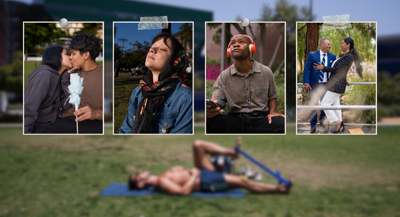
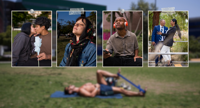



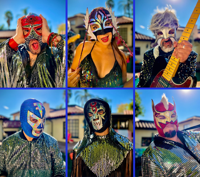

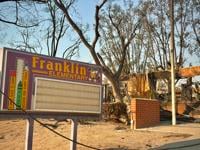

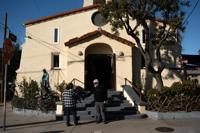
(0) comments
Welcome to the discussion.
Log In
Keep it Clean. Please avoid obscene, vulgar, lewd, racist or sexually-oriented language.
PLEASE TURN OFF YOUR CAPS LOCK.
Don't Threaten. Threats of harming another person will not be tolerated.
Be Truthful. Don't knowingly lie about anyone or anything.
Be Nice. No racism, sexism or any sort of -ism that is degrading to another person.
Be Proactive. Use the 'Report' link on each comment to let us know of abusive posts.
Share with Us. We'd love to hear eyewitness accounts, the history behind an article.